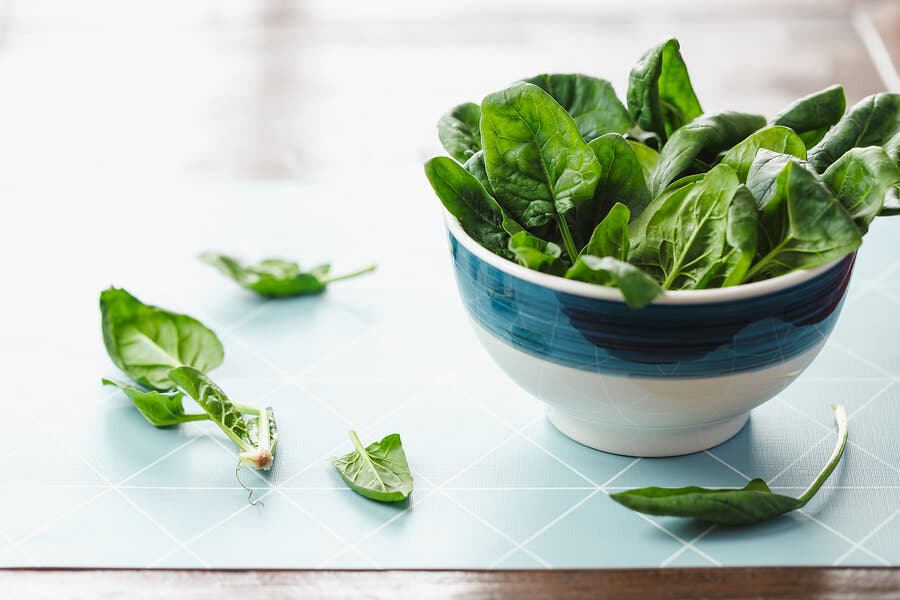Like many other vegetables, spinach is packed with beneficial vitamins, minerals, and phytochemicals. One of these compounds is lutein, a pigment found in many green leafy vegetables. You can buy spinach year-round, fresh, frozen, and canned. The nutritional content of spinach varies if you eat it cooked or raw. In this article we will explain the advantages of eating raw spinach, in addition to mentioning its benefits.

Spinach characteristics you should know
Like many other vegetables, spinach is packed with beneficial vitamins, minerals, and phytochemicals. One of these compounds is lute-in, a pigment that is also present in many green leafy vegetables. It is an antioxidant that works with the immune system and has anti-inflammatory properties.
In detail, other characteristics of spinach are:
- It is a vegetable composed mostly of water.
- It contains very few carbohydrates but is high in protein.
- It is very rich in vitamins and minerals and at the same time it is a very good source of omega 3 fatty acids.
- Minerals: Calcium, Iron, Potassium, Magnesium and Phosphorus.
- Vitamins A, C, E, K and Vitamins of Group B (including folic acid)
Why should we eat raw spinach?
Researchers from Linköping University in Sweden have proven that lutein is especially beneficial for the cardiovascular system as it helps keep arteries in good condition.
Lutein breaks down with heat, so if cooked it loses most of its beneficial effect. Therefore, if you are interested in preserving this specific nutrient to improve your cardiovascular system, you should eat them raw.
In addition, the researchers wanted to see how much the available lutein is reduced with the different cooking methods: cooked in water, steamed or sauteed at different temperatures.
The highest amounts of lutein available were found in smoothies made from raw spinach, especially those containing dairy products (which can be substituted for vegetable milks). Spinach that had been cooked showed lower amounts of lutein, especially in long cookings.
More reasons to eat raw spinach…
Consuming raw spinach can be a good way to protect its high vitamin C content. Raw spinach also has fewer calories than cooked spinach and appears to better retain folates, which are largely lost during cooking.
Another advantage of eating them raw has more to do with our tastes. Since it is a way to maintain its crisp texture, very pleasant in salads or garnishes.
Benefits of eating spinach
1. Protect your brain
Various components of spinach such as potassium, folate, and various antioxidants provide neurological benefits to people who consume it regularly.
According to neurology, folate reduces the onset of Alzheimer’s disease, making spinach a very good option for people who are at high risk for neuronal or cognitive decline.
2. Regulates blood pressure
Spinach is high in potassium and low in sodium. This mineral composition is a benefit for patients with high blood pressure since potassium helps regulate blood pressure while sodium increases it.
3. It could fight some cancers
Spinach is made up of several important elements that have found promise in the treatment and prevention of various types of cancer. The different components of spinach, such as folate, tocopherol and chlorophyllin, act through different mechanisms that are beneficial against this disease.
4. Strengthen your bones
Spinach is a good source of Vitamin K, which works by retaining calcium in the bone matrix, leading to bone mineralization. Apart from this, other minerals like manganese, copper, magnesium, and zinc and phosphorous also help in building strong bones.
This in turn can prevent a person from developing osteoporosis. These minerals are also essential to keep teeth and nails healthy.
5. Strengthen your muscles
A component of spinach, called a C0-Q10 factor, which is an antioxidant, plays an important role in strengthening muscles. Especially the muscles of the heart that continuously pump blood to all parts of the body.
Finally, we remind you that for being prone to form oxalates, those who suffer from arthritis, gout, osteoarthritis and renal colic should avoid it. If you do not identify with these cases, you can enjoy it regularly without problem.















